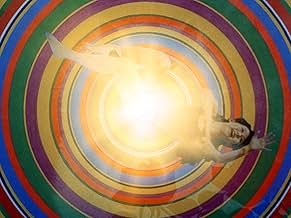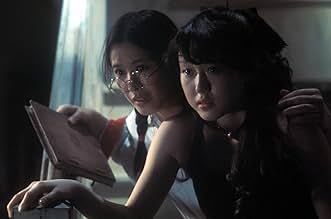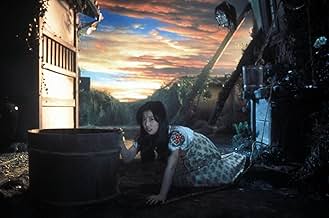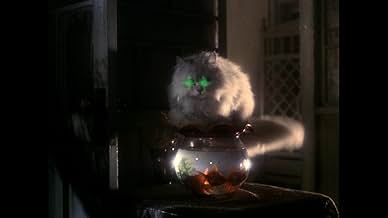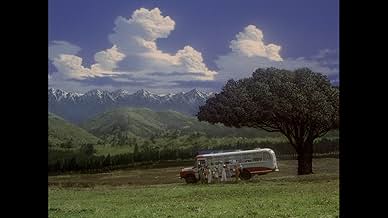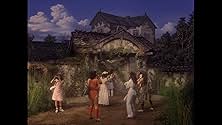Uma estudante e seis de suas colegas de classe viajam para a casa de campo de sua tia, que esta encantada.Uma estudante e seis de suas colegas de classe viajam para a casa de campo de sua tia, que esta encantada.Uma estudante e seis de suas colegas de classe viajam para a casa de campo de sua tia, que esta encantada.
- Direção
- Roteiristas
- Artistas
- Prêmios
- 1 vitória no total
Kumiko Ôba
- Fantasy
- (as Kumiko Ohba)
- Direção
- Roteiristas
- Elenco e equipe completos
- Produção, bilheteria e muito mais no IMDbPro
Avaliações em destaque
The Summer holidays have arrived, and a young schoolgirl known as Gorgeous can't wait to spend time with her film composer father in their palatial villa. It's always been just the two of them, as her mother died when she was young. However, upon returning from a trip to Italy, her father states his intentions to remarry; and Gorgeous immediately changes her vacation plans. Leaving her father and taking six friends along, Gorgeous travels to her reclusive aunt's decrepit mansion in the countryside. At first, everything seems fine, until signs start showing that the house is haunted and that Gorgeous's aunt may not be the kindly old lady she initially seemed to be.
Directed by Nobuhiko Obayashi, 'House' is a comedy-horror of the surrealist variety shot with a distinct, original visual style. The images in the film are bizarre and comedic, not to mention rather dark- particularly in the latter half. Making effective use of odd angles and irregular composition, Yoshitaka Sakamoto's cinematography- as well as the overall look of the film- is occasionally reminiscent of Terry Gilliam's early work with 'Monty Python,' or perhaps a comic-book.
The use of color is also very effective, as well as the juxtaposition of the banal with the grotesque. Sakamoto's work under Obayashi's assured direction results in some unforgettable, incredibly strange sequences and shots. The soundtrack- composed by Asei Kobayashi and the band Godiego- is eerily light and breezy, which is made all the more off-putting when put together with the dark images the film contains.
Unpredictable and macabre, Chiho Katsura's screenplay is a trip into the absurd. From the characters' names to the narrative structure, nothing about this film is ordinary or very serious. You're never really sure what'll happen next, nor where the next joke will come from; watching 'House' can be a deeply rewarding, funny experience (if you appreciate the dark and the strange, that is). Abstract, oddly humorous and thoroughly original; the story is anything but what you'd find in your routine haunted house film.
The set design is fantastically rich, with the main location of the aunt's mansion being especially complex and highly detailed. Combined with the striking cinematography and Nobuo Ogawa's frenetic editing, the film quickly establishes an uneasy atmosphere that makes the oddness and intricacy of the sets even more evident. Add to this the oftentimes kaleidoscopic color design and efficacious use of special effects and you've got a particularly off-beat, distinctive and memorable movie.
It's surprising to learn that many of the cast weren't professional actors at the time, as every performance in the film is strong. Miki Jinbo and Kumiko Oba are particularly good, as two of Gorgeous's pals who accompany her on the holiday, named Kung Fu and Fantasy respectively (as one knows martial arts and the other has an active imagination). They are unselfconscious performers who give their roles their all, both impressing with their tenacity and acting depth. Jinbo also gets to show off her fighting skills throughout the film, leaving an indelible impression on the viewer.
The late Yoko Minamida also stands out as the sinister aunt, obviously reveling in the chance to play such a weird, creepy character. Kimiko Ikegami's star turn as Gorgeous must also be mentioned, as she brings an unsettling, subtle intensity to the role that is very interesting to watch. She's sympathetic, as well as being- especially later in the film- rather frightening: a very fine piece of acting overall.
Well-acted, strange as can be and arcanely dark, 'House' is a unique experience at the cinema that is both unforgettable and unfathomable. Full of abstractions, this horror is made with an artistic sensibility as well as a pitch-black sense of humor (that occasionally borders on parody). If you want to watch something different- something outside of the ordinary realm of filmmaking- you can't go wrong with 'House.' It's bloody, unpredictable and a whole lot of fun.
Directed by Nobuhiko Obayashi, 'House' is a comedy-horror of the surrealist variety shot with a distinct, original visual style. The images in the film are bizarre and comedic, not to mention rather dark- particularly in the latter half. Making effective use of odd angles and irregular composition, Yoshitaka Sakamoto's cinematography- as well as the overall look of the film- is occasionally reminiscent of Terry Gilliam's early work with 'Monty Python,' or perhaps a comic-book.
The use of color is also very effective, as well as the juxtaposition of the banal with the grotesque. Sakamoto's work under Obayashi's assured direction results in some unforgettable, incredibly strange sequences and shots. The soundtrack- composed by Asei Kobayashi and the band Godiego- is eerily light and breezy, which is made all the more off-putting when put together with the dark images the film contains.
Unpredictable and macabre, Chiho Katsura's screenplay is a trip into the absurd. From the characters' names to the narrative structure, nothing about this film is ordinary or very serious. You're never really sure what'll happen next, nor where the next joke will come from; watching 'House' can be a deeply rewarding, funny experience (if you appreciate the dark and the strange, that is). Abstract, oddly humorous and thoroughly original; the story is anything but what you'd find in your routine haunted house film.
The set design is fantastically rich, with the main location of the aunt's mansion being especially complex and highly detailed. Combined with the striking cinematography and Nobuo Ogawa's frenetic editing, the film quickly establishes an uneasy atmosphere that makes the oddness and intricacy of the sets even more evident. Add to this the oftentimes kaleidoscopic color design and efficacious use of special effects and you've got a particularly off-beat, distinctive and memorable movie.
It's surprising to learn that many of the cast weren't professional actors at the time, as every performance in the film is strong. Miki Jinbo and Kumiko Oba are particularly good, as two of Gorgeous's pals who accompany her on the holiday, named Kung Fu and Fantasy respectively (as one knows martial arts and the other has an active imagination). They are unselfconscious performers who give their roles their all, both impressing with their tenacity and acting depth. Jinbo also gets to show off her fighting skills throughout the film, leaving an indelible impression on the viewer.
The late Yoko Minamida also stands out as the sinister aunt, obviously reveling in the chance to play such a weird, creepy character. Kimiko Ikegami's star turn as Gorgeous must also be mentioned, as she brings an unsettling, subtle intensity to the role that is very interesting to watch. She's sympathetic, as well as being- especially later in the film- rather frightening: a very fine piece of acting overall.
Well-acted, strange as can be and arcanely dark, 'House' is a unique experience at the cinema that is both unforgettable and unfathomable. Full of abstractions, this horror is made with an artistic sensibility as well as a pitch-black sense of humor (that occasionally borders on parody). If you want to watch something different- something outside of the ordinary realm of filmmaking- you can't go wrong with 'House.' It's bloody, unpredictable and a whole lot of fun.
A girl has just gotten a new stepmother, which greatly displeases her. So she decides to take her six one-character-trait friends and go visit her aunt on the countryside. In her aunt's house strange things start to happen.
House, or Hausu if you prefer, is certainly something you'll remember for the rest of your days. Director Nobuhiko Obayashi intentionally wanted to make something with a very low budget, blatantly simplistic characters and events so bizarre and out of the left field that they would need no justification. And this honest commitment to weirdness is what makes the movie so enjoyable. Pretty much from the get-go you're being told that you're not supposed to take this too seriously, not supposed to think too much about it.
And when you allow yourself to relax, lean back into your cushions and just take it in, it's a lot of fun. Does it make any sense? No, but it's not supposed to. However, it is a bit hard to follow, which can be a problem even with a film such as this. The seven girls are hard to tell apart, especially when they all dress and act pretty similarly. There are some outliers, but even still the character roster could have used a trim.
Still, it's hard to criticize a film whose entire purpose is to step outside the norms and the expectations. If you're looking for an experience and don't mind horror tropes being made fun of, this might be your film.
House, or Hausu if you prefer, is certainly something you'll remember for the rest of your days. Director Nobuhiko Obayashi intentionally wanted to make something with a very low budget, blatantly simplistic characters and events so bizarre and out of the left field that they would need no justification. And this honest commitment to weirdness is what makes the movie so enjoyable. Pretty much from the get-go you're being told that you're not supposed to take this too seriously, not supposed to think too much about it.
And when you allow yourself to relax, lean back into your cushions and just take it in, it's a lot of fun. Does it make any sense? No, but it's not supposed to. However, it is a bit hard to follow, which can be a problem even with a film such as this. The seven girls are hard to tell apart, especially when they all dress and act pretty similarly. There are some outliers, but even still the character roster could have used a trim.
Still, it's hard to criticize a film whose entire purpose is to step outside the norms and the expectations. If you're looking for an experience and don't mind horror tropes being made fun of, this might be your film.
Oh my goodness, what at trippy, crazy, cheesy little movie this is. I don't think it has a single scene in it which doesn't have some type of campy, surreal special effect. Early on it seems like part Wes Anderson, part after-school special, part J-pop, part
I don't know, just 'out there', and certainly unique. It gets weirder and weirder as it goes. If you love the bizarre and the downright silly, movies which don't take themselves too seriously and are out to throw wild images at you, you'll probably love this film. Director Nobuhiko Obayashi has a real flair, and he's not out to make things look super-realistic, he's out to entertain. If you're looking for a ghost story, real drama, or horror, well, this isn't it. You never feel real tension, even as the cute little girls are attacked by mattresses, devoured by a piano, etc etc. For me I suppose I fell more in the latter camp, wishing the film had some balance in creating a film about the supernatural, but you can easily see why it has a bit of a cult attraction to it, and your mileage may vary.
Wow! Noribuki Obayashi's "Hausu" aka. "House" of 1977 is easily one of the weirdest films I ever saw and I generally generally am a fan of the bizarre. A Horror-fan and avid lover of Japanese cinema, especially from the 70s, I had high expectations for this film, and I was not disappointed, even though the film was totally different than what I had expected. Having read no reviews of the film before seeing it, I expected a pure Horror film, but it turned out to be an incomparably bizarre and experimental Horror-parody, with a delightfully macabre and grotesque humor rather than scares. The film already starts out extremely strange (in an awesome manner), and it gradually gets weirder and weirder as it goes on.
The film starts off with a bunch of teenage high-school girls, all of whom have certain distinctive characteristics that are mentioned in their nicknames, who travel to the countryside to visit the aunt of one of the girls. I don't want to spoil even a tiny bit of the plot of this unique Horror-parody, and therefore won't carry with a plot description, but I can assure that fans of surrealism and weird cinema will be delighted. While "Hausu" is not a film I would recommend to everyone, this is an absolute must-see to all my fellow fans of Japanese film, the Horror-genre and bizarre art-house cinema. Director Obayashi uses a bizarre of editing imaginable, with grotesque cutting, totally insane effects. Sometimes the editing equals that of a (bizarre) video-clip, only to jump to an entirely different style. Yet all this strangeness never draws the viewer away from the story, which is itself just as surreal as the film's style. Overall "Hausu" can be described as a unique and bizarre fairy tale with a grotesque and ingenious, often macabre and always unique sense of humor. There are moments in this film at which the viewer will just stare at the screen not knowing what to think, and scenes at which one is barely able to breathe in laughter, and every second of the film is very strange. Very delightfully strange that is, as "Hausu" is a bizarre gem that must not be missed by lovers of the surreal. Mainstream audiences might not know what to think of this, but every fan of a more unique form of cinema should give this a try. Surreal, exceptional, and one of a kind!
The film starts off with a bunch of teenage high-school girls, all of whom have certain distinctive characteristics that are mentioned in their nicknames, who travel to the countryside to visit the aunt of one of the girls. I don't want to spoil even a tiny bit of the plot of this unique Horror-parody, and therefore won't carry with a plot description, but I can assure that fans of surrealism and weird cinema will be delighted. While "Hausu" is not a film I would recommend to everyone, this is an absolute must-see to all my fellow fans of Japanese film, the Horror-genre and bizarre art-house cinema. Director Obayashi uses a bizarre of editing imaginable, with grotesque cutting, totally insane effects. Sometimes the editing equals that of a (bizarre) video-clip, only to jump to an entirely different style. Yet all this strangeness never draws the viewer away from the story, which is itself just as surreal as the film's style. Overall "Hausu" can be described as a unique and bizarre fairy tale with a grotesque and ingenious, often macabre and always unique sense of humor. There are moments in this film at which the viewer will just stare at the screen not knowing what to think, and scenes at which one is barely able to breathe in laughter, and every second of the film is very strange. Very delightfully strange that is, as "Hausu" is a bizarre gem that must not be missed by lovers of the surreal. Mainstream audiences might not know what to think of this, but every fan of a more unique form of cinema should give this a try. Surreal, exceptional, and one of a kind!
Hausu is basically the most bizarre Haunted House movie I've ever seen. The story follows a group of girlfriends who head to the country for vacation. They go to one of the girl's Aunt's house to spend their time. But beknownst to all of them the Aunt isn't really who she says she is. And there's a cat named Snowflake that obviously has some issues. Girls begin experiencing the supernatural and things don't seem to be slowing up. Reading back what I just wrote kinda makes the movie seem not so interesting. Seems like just another haunted house flick. But if you pop in this flick, almost immediately you will realize you've never seen a film like this. Filmed in a lively, colorful way mixed with a fantastic soundtrack, the flick exceeds on all levels of production. Combine the production values with a children's movie feel, then combine that with some blood, violence and nudity, you get a very different hybrid genre of a flick. Hausu is a flick that all fans of unique horror or cinema for that matter should check out.
Você sabia?
- CuriosidadesAccording to director Nobuhiko Ôbayashi, this is the first Japanese film to use video effects, which he applied in a scene to make one of the girls "dissolve" underwater through low fidelity video and a simple chroma key effect.
- Erros de gravaçãoWhen Mac's head floats and spins around in the air, the wires supporting the severed head are visible for a split second.
- Citações
Farmer selling watermelons: Do you like watermelons?
Keisuke Tougou-sensei: No! I like bananas!
Farmer selling watermelons: BANANAS?
[he turns into a skeleton, which then falls apart]
- Cenas durante ou pós-créditosThe first half of the ending credits runs over candid footage of the actresses. During the second half, the credits appear over the poster illustration (similar to the Masters of Cinema cover, but with more color), scrolling up the ''tongue'' of the house. The main characters also show up on the sides of the screen.
- ConexõesEdited from Tempestade no Pacífico (1960)
- Trilhas sonorasMain Theme
Principais escolhas
Faça login para avaliar e ver a lista de recomendações personalizadas
- How long is House?Fornecido pela Alexa
Detalhes
- Data de lançamento
- País de origem
- Central de atendimento oficial
- Idioma
- Também conhecido como
- Hausu
- Locações de filme
- Empresas de produção
- Consulte mais créditos da empresa na IMDbPro
Bilheteria
- Faturamento bruto nos EUA e Canadá
- US$ 209.765
- Fim de semana de estreia nos EUA e Canadá
- US$ 12.032
- 17 de jan. de 2010
- Faturamento bruto mundial
- US$ 218.872
- Tempo de duração
- 1 h 28 min(88 min)
- Cor
- Mixagem de som
- Proporção
- 1.37 : 1
Contribua para esta página
Sugerir uma alteração ou adicionar conteúdo ausente



